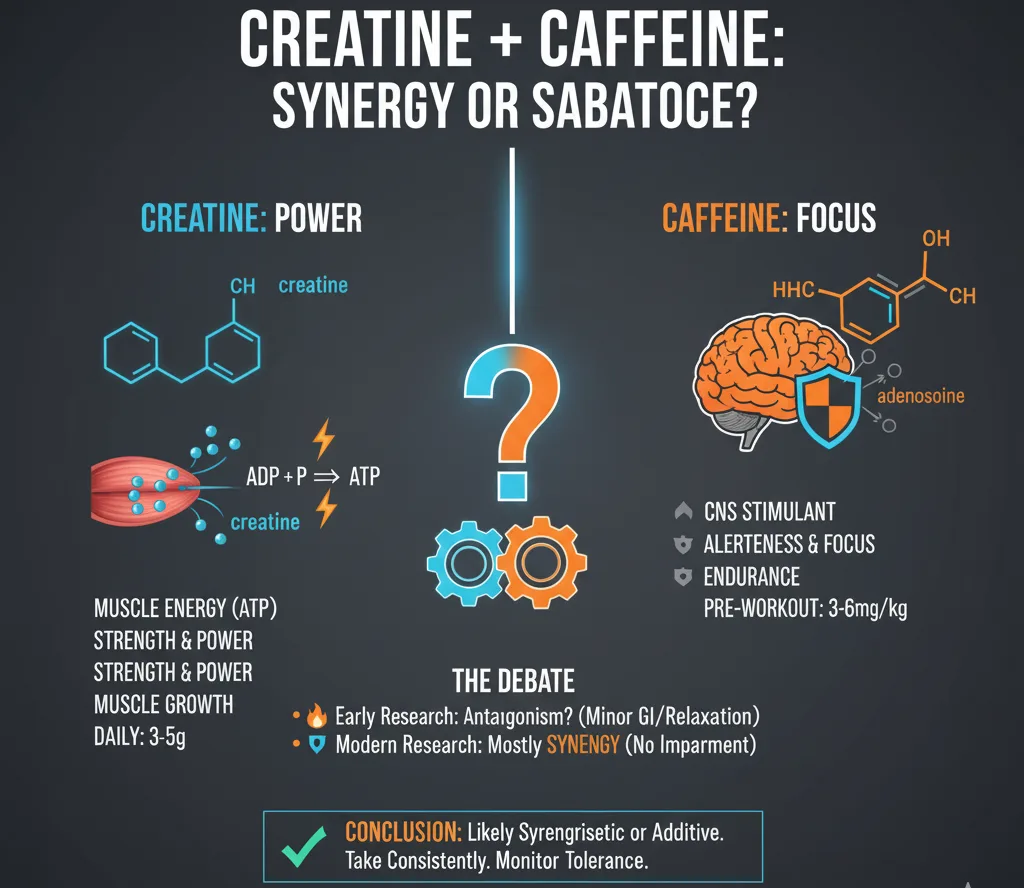Creatine and caffeine are two of the most popular and scientifically supported ergogenic aids in the world of sports performance. Individually, both have a proven track record for enhancing athletic performance, but their combined use has been a subject of debate and conflicting research for decades. Understanding their distinct mechanisms of action is key to evaluating their potential interaction.
The Power of Creatine
Creatine is a naturally occurring compound derived from three amino acids: arginine, glycine, and methionine. It is primarily stored in skeletal muscle as phosphocreatine. During high-intensity, short-duration activities (like weightlifting or sprinting), phosphocreatine rapidly donates a phosphate group to adenosine diphosphate (ADP) to regenerate adenosine triphosphate (ATP). ATP is the immediate energy source for muscle contractions. By increasing the body's phosphocreatine stores, creatine supplementation allows for:
Increased Strength and Power: More ATP means more energy for explosive movements.
Improved High-Intensity Performance: Users can perform more reps or sprints before fatigue sets in.
Enhanced Muscle Growth: Creatine draws water into muscle cells, contributing to cell volumization, which can signal anabolic processes.
The most common and effective form is creatine monohydrate, typically taken in a loading phase (e.g., 20g/day for 5-7 days) followed by a maintenance phase (e.g., 3-5g/day).
The Kick of Caffeine
Caffeine is a central nervous system (CNS) stimulant belonging to the methylxanthine class. Its primary mechanism of action involves blocking adenosine receptors in the brain. Adenosine is a neurotransmitter that promotes relaxation and drowsiness. By blocking these receptors, caffeine prevents adenosine from binding, leading to:
Increased Alertness and Focus: Reduced perception of fatigue.
Enhanced Energy Levels: A feeling of being more awake and energetic.
Improved Endurance: By influencing pain perception and fat oxidation, caffeine can help extend endurance performance.
Mild Analgesic Effects: Can reduce perceived muscle pain during exercise.
Caffeine's effects are typically felt within 30-60 minutes and can last for several hours. Doses for performance enhancement usually range from 3-6 mg per kilogram of body weight.
The Debate: Are They Friends or Foes?
For many years, some research suggested that combining creatine and caffeine might negate or reduce their individual benefits, leading to an antagonistic effect. The proposed mechanisms for this antagonism included:
Opposing Effects on Muscle Relaxation Time: Some early theories suggested that caffeine might interfere with creatine's ability to affect muscle relaxation, but this idea has largely been unsubstantiated by more robust studies.
Gastrointestinal Distress: High doses of both compounds can sometimes lead to gastrointestinal upset, which might indirectly hinder performance.
Diuretic Effect of Caffeine: Early concerns suggested that caffeine's mild diuretic effect might counteract creatine's muscle cell volumization, but modern research indicates that moderate caffeine intake does not significantly dehydrate users or interfere with creatine uptake.
However, the predominant body of more recent and comprehensive research suggests that for most individuals, the combination of creatine and caffeine is NOT antagonistic and, in many cases, can be synergistic or at least additive in terms of performance benefits.
Several studies have shown that:
-Caffeine does not impair creatine's ability to increase phosphocreatine stores in muscles.
-The performance benefits (e.g., strength, power, endurance) of each supplement can still be realized when taken together.
-Some individuals might experience a perceived reduction in effect, possibly due to individual sensitivities or the overwhelming stimulatory effect of caffeine masking subtle creatine benefits.
Key Recommendation:
While current evidence largely discredits the idea of direct antagonism, it's advisable for individuals to assess their personal tolerance and response. Some prefer to take them at different times of the day (e.g., creatine daily, caffeine pre-workout), while others have no issues taking them simultaneously. The most important thing is consistent creatine use to saturate muscle stores, and strategic caffeine use for acute performance benefits.

